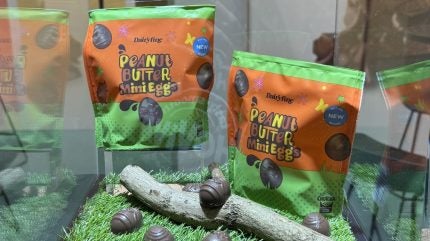
Germany-based cocoa-free supplier Planet A Foods has entered the UK market with the launch of a chocolate-alternative product in retailer Aldi.
The group worked with the Rhineland-based chocolate and confectionary maker Wawi-Schokolade, one of its long-term partners, to produce peanut butter mini eggs, which are being sold under Aldi’s Dairyfine brand.

Discover B2B Marketing That Performs
Combine business intelligence and editorial excellence to reach engaged professionals across 36 leading media platforms.
At a RRP of £1.49 ($1.88) per 90g bag, the product is being sold as a seasonal Easter offering, and is available in Aldi supermarkets across the UK from this week.
“The first product launch in the UK marks an important step in further advancing the availability of ChoViva globally”, Planet A Foods told Just Food.
“We are increasing awareness and brand presence of our cocoa-free chocolate alternative for end consumers and our expansion helps demonstrate that ChoViva is a scalable ingredient for the confectionery industry.”
The business added that it was in talks with other retailers in the UK with the view of bringing in “additional products with ChoViva across different distribution channels”.

US Tariffs are shifting - will you react or anticipate?
Don’t let policy changes catch you off guard. Stay proactive with real-time data and expert analysis.
By GlobalDataFounded in 2021, Munich-based Planet A Foods has been developing products with its ChoViva sunflower seed-based cocoa alternative solely for the Germany market since 2023.
It now has about 30 products on the market, having worked in development with German retailer Rewe, as well as cereals and biscuits manufacturer Peter Kölln and Swiss chocolate giant Lindt & Sprüngli.
In addition to the UK, the group is also launching a seasonal product for the Easter season in France.
Planet A Foods told Just Food the group had partnered with French business Abtey Chocolaterie to sell “several” products in numerous supermarket chains from the middle of March.
Speaking to this publication last June, CEO Max Marquart said the business had “seen a lot of success in the bakery domain, so cakes, convenience cakes, cookies, biscuits”.
Following the UK and France, Planet A Foods said the US was “another key market we’re targeting right now”.
Cocoa-free alternatives to chocolate are slowly but steadily gaining a presence, as prices of real cocoa continue to climb.
In December, cocoa futures contracts reached new heights due to poor weather in key cocoa-growing regions in west Africa, resulting in supply shortages and marking the third year of a worldwide stockpile deficit.
Conditions have been made worse by the seasonal Harmattan dry wind pattern that blows across north-west Africa from November to March and could potentially disrupt supplies further.
While the cocoa-free space is largely dominated by SMEs, large food companies have also shown an interest.
In 2023, US-based Voyage Foods tied up with agricultural heavyweight Cargill for a global business-to-business distribution partnership.
Voyage Foods also announced plans last year to open up a new facility in Ohio to produce its cocoa-free chocolate, nut-free spreads and beanless coffee.
Other players in the business include UK-based Win-Win and Nukoko, which received investment from German ingredients business Döhler in October.
Döhler described the investment as a “strategic partnership” but did not disclose the size of the cash injection, nor whether it has taken a stake in Nukoko, which produces alternatives to chocolate from fava beans using a fermentation process.
In a statement at the time, the group said the partnership would look to “enable both companies to scale Nukoko’s innovative fermentation process to an industrial level by 2025”.





